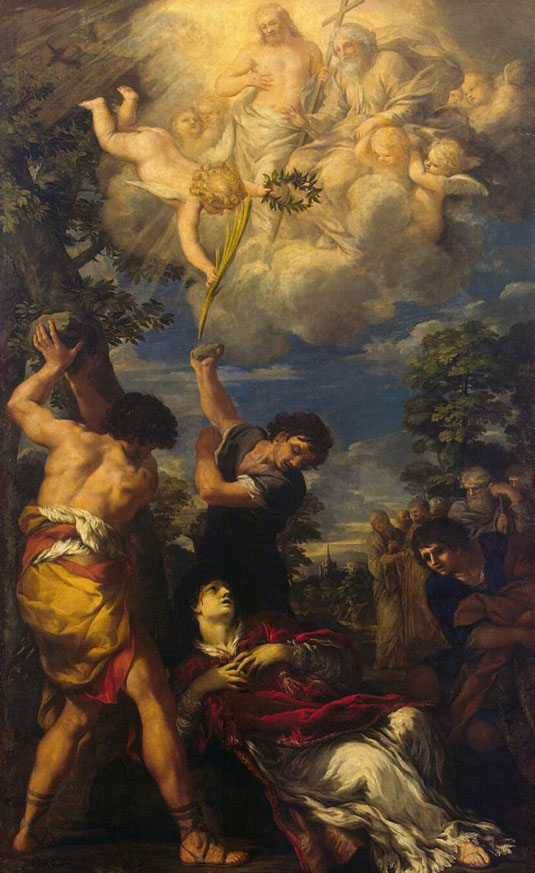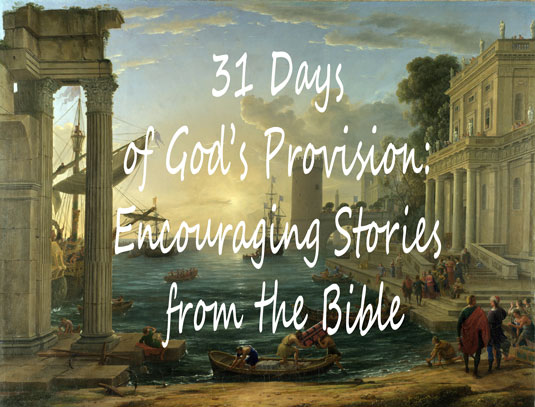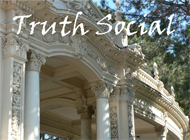 Stephen’s story is found in the New Testament book of Acts, and occurs after the resurrection and ascension of Jesus. Stephen is a deacon in the early Church, and is a powerful witness in Jerusalem. Filled with the Holy Spirit, he performs great signs and wonders as a testament to Christ. Believers are sharing the gospel message and many people are choosing to follow Jesus, but not everyone is happy about the spread of Christianity. Chief among the dissenters are the Jewish leaders, and members of the Synagogue. A certain young Pharisee named Saul makes a name for himself by pursing the Jesus-rebel- rousers, and a great persecution of believers begins.
Stephen’s story is found in the New Testament book of Acts, and occurs after the resurrection and ascension of Jesus. Stephen is a deacon in the early Church, and is a powerful witness in Jerusalem. Filled with the Holy Spirit, he performs great signs and wonders as a testament to Christ. Believers are sharing the gospel message and many people are choosing to follow Jesus, but not everyone is happy about the spread of Christianity. Chief among the dissenters are the Jewish leaders, and members of the Synagogue. A certain young Pharisee named Saul makes a name for himself by pursing the Jesus-rebel- rousers, and a great persecution of believers begins.
When our story opens, Stephen has amassed some serious enemies. The Jews who oppose follows of Christ would like nothing more than to silence Stephen permanently. So, like all good conspiracies, they persuade some unscrupulous men to falsely accuse Stephen of blasphemy.
So they stirred up the people and the elders and the teachers of the law. They seized Stephen and brought him before the Sanhedrin. They produced false witnesses, who testified, “This fellow never stops speaking against this holy place and against the law. For we have heard him say that this Jesus of Nazareth will destroy this place and change the customs Moses handed down to us.” Acts 6:12-14, NIV
Followers of Jesus correctly understood that he came to fulfill the law not to abolish the law, as stated by Christ himself.
“Do not think that I have come to abolish the Law or the Prophets; I have not come to abolish them but to fulfill them. For truly I tell you, until heaven and earth disappear, not the smallest letter, not the least stroke of a pen, will by any means disappear from the Law until everything is accomplished.” Matthew 5:17-18, NIV
The high priest asks Stephen if he has indeed committed blasphemy, and Stephen responds to these charges by providing the assembly with a narrative of Jewish history. Starting with the call of God to Abraham, Stephen recounts how God has repeatedly provided for his people and how they have repeatedly rejected his care. When he wanted a relationship with them, they chased after idols. When he spoke to his people through the prophets, they ignored his attempts to chasten them. When he promised to send them a savior, they did not recognize his arrival. The learned teachers knew every letter of the law, but they failed miserably to understand the meaning of the law.
“You stiff-necked people! Your hearts and ears are still uncircumcised. You are just like your ancestors: You always resist the Holy Spirit! Was there ever a prophet your ancestors did not persecute? They even killed those who predicted the coming of the Righteous One. And now you have betrayed and murdered him— you who have received the law that was given through angels but have not obeyed it.” Acts 7:51-53
Confronted with the truth, the crowd becomes violent. Instead of considering the words of Stephen, these men are enraged, as evil people generally are when they’d rather continue in their sin. Knowing that this will be Stephen’s final witness to these people, God opens a supernatural portal allowing Stephen to gaze upon heaven.
When the members of the Sanhedrin heard this, they were furious and gnashed their teeth at him. But Stephen, full of the Holy Spirit, looked up to heaven and saw the glory of God, and Jesus standing at the right hand of God. “Look,” he said, “I see heaven open and the Son of Man standing at the right hand of God.” Acts 7:54-56, NIV
Stephen’s description of Jesus in the presence of God sends them over the edge.
At this they covered their ears and, yelling at the top of their voices, they all rushed at him, dragged him out of the city and began to stone him. Meanwhile, the witnesses laid their coats at the feet of a young man named Saul. Acts 7:57-58, NIV
The fact that Saul, a zealous persecutor of the early church, was present during Stephen’s final testimony is significant. Later God would pay a very special visit to Saul, changing the course of his life and using him in a way that would literally impact millions of people.
In his final moments, Stephen is surrounded by a peace not understood by those stoning him. After praying for his murderers, Stephen is ushered into the arms of God.
While they were stoning him, Stephen prayed, “Lord Jesus, receive my spirit.” Then he fell on his knees and cried out, “Lord, do not hold this sin against them.” When he had said this, he fell asleep. Acts 7:59-60, NIV
Stephen was a faithful servant who willingly put himself in harm’s way to stand firm in his devotion to Christ. While God could have spared his life, Stephen’s death was a powerful testimony to the religious leaders of his day and to skeptical people of our day. His commitment to the truth was more important to him than his life. Jesus is the promised Messiah of the Old Testament. He is the Prince of Peace, and it is through him that we, like Stephen, are granted peace in the midst of chaos.
Stephen’s story was one of brutality, but God’s provision was one of peace.
Join me tomorrow for a story involving a grieving father, a secret identity, and a provision of reconciliation!
 If you’ve missed any part of this series, you can find all of the posts in the side bar category 31 Days of God’s Provision.
If you’ve missed any part of this series, you can find all of the posts in the side bar category 31 Days of God’s Provision.
On the journey toward Home,












{ 2 trackbacks }